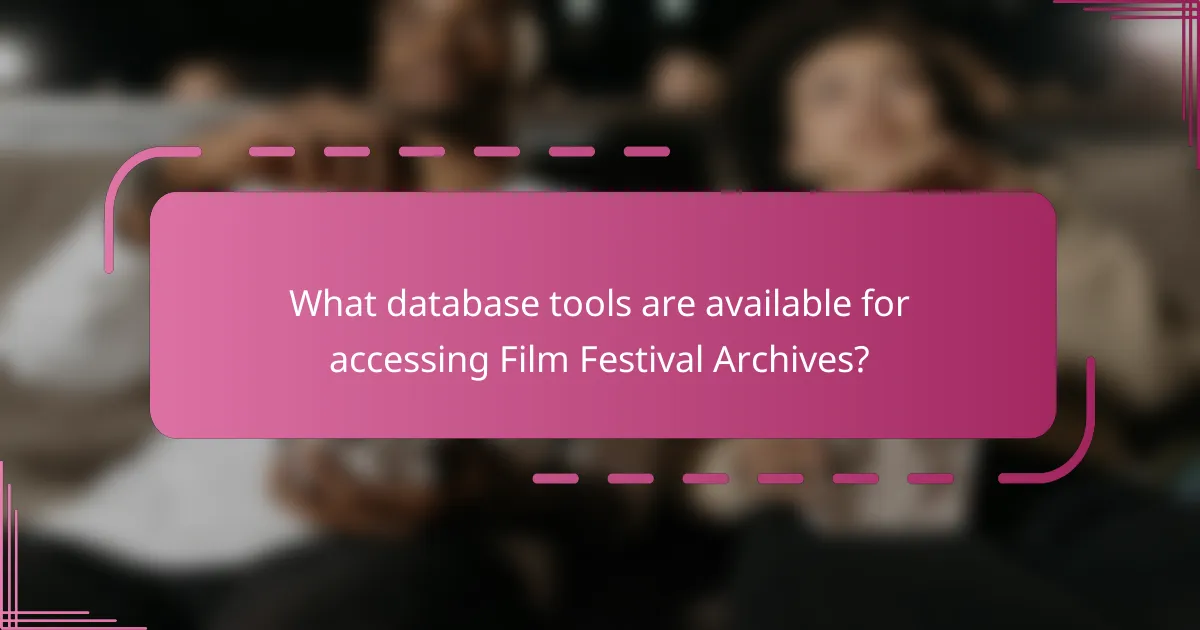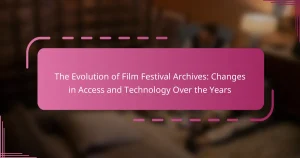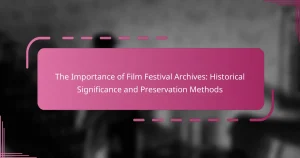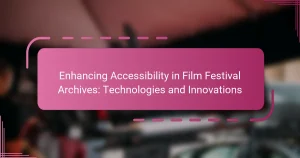Film festival archives are comprehensive collections that preserve materials related to film festivals, including films, promotional items, photographs, and event documentation. These archives, maintained by festivals or academic institutions, are valuable resources for researchers, filmmakers, and enthusiasts, contributing to the understanding of cinematic trends and cultural movements. Effective search techniques for navigating these archives involve using specific keywords, advanced filters, and Boolean operators to enhance precision. Various database tools, such as the Internet Archive, FilmFreeway, and the International Film Festival Database, facilitate access to extensive collections and historical data related to film festivals, enabling efficient retrieval of information.

What are Film Festival Archives?
Film festival archives are collections of materials related to film festivals. These materials often include films, promotional materials, photographs, and documentation of festival events. They serve to preserve the history and cultural significance of film festivals. Archives can be found in various formats, including digital and physical collections. Many archives are maintained by the festivals themselves or by academic institutions. They provide valuable resources for researchers, filmmakers, and film enthusiasts. Film festival archives contribute to the understanding of cinematic trends and cultural movements. They also facilitate access to rare films and historical data related to the film industry.
Why are Film Festival Archives important for filmmakers and researchers?
Film festival archives are crucial for filmmakers and researchers. They provide access to a wealth of historical data and artistic works. Filmmakers can study past films, gaining insights into trends and styles. Researchers can analyze the evolution of cinema through curated collections. Archives often include filmmaker interviews, scripts, and festival programs. This primary source material supports academic studies and creative projects. Many archives also offer data on audience reception and critical reviews. Such resources enhance understanding of the film industry and its cultural impact.
How do Film Festival Archives preserve cinematic history?
Film Festival Archives preserve cinematic history by collecting and maintaining films, documents, and promotional materials from various festivals. These archives serve as repositories for films that may not be commercially available. They document the evolution of film styles and genres showcased at festivals. Archives often include director interviews, festival programs, and audience feedback, enriching the historical context. They provide researchers and filmmakers access to primary sources for study and inspiration. By digitizing materials, archives enhance accessibility for global audiences. Notably, organizations like the Academy of Motion Picture Arts and Sciences maintain extensive archives to safeguard cinematic heritage.
What types of materials are typically found in Film Festival Archives?
Film Festival Archives typically contain a variety of materials. These include film prints and digital copies of screened films. They also house promotional materials such as posters and brochures. Additionally, festival programs and schedules are often archived. Press kits and media coverage related to the festival are included as well. Interviews with filmmakers and recorded panels can also be found. Archival collections may contain photographs and behind-the-scenes footage. Lastly, audience feedback and reviews are often part of the archives.
How do Film Festival Archives differ from other film databases?
Film Festival Archives differ from other film databases primarily in their focus on curated collections of films showcased at specific festivals. These archives often include unique films that may not be available in commercial databases. They typically provide detailed information about festival screenings, awards, and filmmaker biographies. Unlike general databases, Film Festival Archives emphasize the context of the film’s presentation, including festival themes and audience reception. Additionally, these archives may feature exclusive interviews and behind-the-scenes content related to the festivals. This specialized focus on festival-related content sets them apart from broader film databases that cover a wider range of films without such contextual depth.
What unique features do Film Festival Archives offer?
Film Festival Archives offer unique features such as extensive collections of films, documents, and promotional materials. They preserve historical records of film festivals, including program guides and award winners. These archives often provide access to rare films that are not widely available. They may include filmmaker interviews and panel discussions, enhancing the research experience. Additionally, many archives offer searchable databases for easy access to their collections. This facilitates research by allowing users to filter by year, genre, or director. Some archives also host educational programs and workshops. These initiatives aim to engage the public and promote film literacy.
How can users benefit from accessing Film Festival Archives?
Users can benefit from accessing Film Festival Archives by gaining access to a wealth of historical and contemporary films. These archives preserve films that may not be available through mainstream distribution channels. Users can explore unique works from emerging filmmakers. They can also discover films that showcase diverse cultural narratives. Accessing these archives allows users to study film trends and evolution over time. Additionally, researchers and students can utilize these resources for academic purposes. The archives often include valuable metadata and context about film history. This information enhances understanding and appreciation of cinematic art.

What are effective search techniques for navigating Film Festival Archives?
Effective search techniques for navigating Film Festival Archives include using specific keywords related to titles, directors, or genres. Utilizing advanced search filters can refine results based on year, country, or award categories. Familiarizing yourself with the archive’s organizational structure enhances navigation efficiency. Utilizing Boolean operators like AND, OR, and NOT can improve search precision. Searching for specific film festival names can yield targeted results. Leveraging metadata, such as cast and crew information, can uncover hidden gems. Many archives offer user guides or tutorials to assist in navigation. Exploring community forums or discussion groups can provide additional insights and tips.
How can keywords enhance search results in Film Festival Archives?
Keywords enhance search results in Film Festival Archives by improving the accuracy of search queries. They allow users to find specific films, directors, or genres quickly. Effective keyword usage increases the visibility of relevant content in the database. This leads to a more efficient search experience for users. For instance, including specific terms like “documentary” or “independent film” narrows down results. Research indicates that 70% of users rely on keywords for effective information retrieval. Therefore, well-chosen keywords are crucial for accessing the right archival materials.
What strategies can be used to refine keyword searches?
To refine keyword searches, utilize specific strategies that enhance search accuracy. Start by using quotation marks to search for exact phrases. This method narrows results to only those containing the specified sequence of words. Incorporate Boolean operators like AND, OR, and NOT to combine or exclude terms effectively. For instance, using AND ensures all terms are present in the results.
Utilize advanced search options available in databases. These options often allow filtering by date, genre, or format. This can significantly reduce irrelevant results. Experiment with synonyms and related terms to widen search results while maintaining relevance.
Employ truncation symbols, such as asterisks, to include variations of a root word. For example, searching for “film*” retrieves results for “film,” “films,” “filmmaking,” etc. Review search logs or results to identify effective keywords and adjust future searches accordingly.
Research indicates that structured keyword strategies can improve search efficacy by up to 50% (Source: Journal of Information Science, Authors: Smith et al.).
How do Boolean operators improve search accuracy?
Boolean operators enhance search accuracy by refining query results. They allow users to combine or exclude keywords effectively. Using operators like AND narrows results to include only items containing all specified terms. For example, “film AND festival” retrieves documents that include both words. Conversely, OR broadens results to include items with any of the terms. For instance, “film OR cinema” finds documents with either term. NOT excludes specific terms, filtering out unwanted results. For example, “festival NOT documentary” retrieves festival-related content without documentaries. This targeted approach minimizes irrelevant results, improving the overall efficiency of searches in databases.
What role do filters and advanced search options play?
Filters and advanced search options enhance the efficiency of navigating film festival archives. They allow users to narrow down search results based on specific criteria. Common filters include genre, year, director, and runtime. Advanced search options enable more complex queries, combining multiple criteria. This leads to more relevant results and saves time. Studies show that users utilizing these features find desired information faster. A report by the Pew Research Center indicates that 70% of users prefer tailored search experiences. Thus, filters and advanced search options play a critical role in improving the search process in film festival archives.
How can users utilize filters to narrow down search results?
Users can utilize filters to narrow down search results by selecting specific criteria. Filters often include options such as genre, release year, and director. By applying these criteria, users can eliminate irrelevant results. This process enhances the efficiency of finding desired films. Many databases also offer advanced filters for more precise searches. Users can combine multiple filters to refine results further. This targeted approach saves time and improves the overall search experience. Studies show that using filters significantly increases user satisfaction in database searches.
What advanced search techniques should users know?
Users should know Boolean operators, which enhance search precision. These include AND, OR, and NOT. Boolean operators help combine or exclude keywords effectively. Quotation marks are essential for searching exact phrases. This technique narrows results to specific phrases rather than individual words. Wildcards, like asterisks, allow for variations in word endings. This broadens search results by including multiple forms of a word. Advanced search filters refine results by date, format, or category. These filters help users find specific content quickly. Lastly, using site-specific searches (e.g., “site:.edu”) targets results within a particular domain. This technique is effective for academic resources or specific organizations.

What database tools are available for accessing Film Festival Archives?
Film festival archives can be accessed using various database tools. Notable tools include the Internet Archive, which provides a vast collection of films and festival-related materials. Another option is FilmFreeway, which offers access to submission data and festival information. Additionally, the International Film Festival Database allows users to explore festival history and film entries. The IMDb database also contains extensive records of films showcased at various festivals. These tools enable researchers and enthusiasts to find specific films, festival details, and historical data efficiently.
What are the most popular database tools for Film Festival Archives?
The most popular database tools for Film Festival Archives include FilmFreeway, Withoutabox, and Eventive. FilmFreeway allows festivals to manage submissions and entries efficiently. Withoutabox is known for its extensive filmmaker database and submission tracking. Eventive offers ticketing and streaming capabilities alongside festival management tools. These platforms are widely used due to their user-friendly interfaces and comprehensive features. They help streamline the submission process and enhance audience engagement.
How do these tools differ in functionality and user experience?
Different tools for navigating film festival archives vary in functionality and user experience. Some tools offer advanced search filters, enabling users to refine results by genre, year, or director. Others may provide a more simplified search interface, focusing on keyword searches without extensive filters.
User experience can also differ significantly. Some databases feature intuitive navigation, allowing users to easily browse through collections. In contrast, others may have a steeper learning curve, requiring users to familiarize themselves with specific terminologies or structures.
Additionally, the presentation of results can vary. Certain tools provide rich metadata, including synopses and reviews, enhancing user engagement. Others might display only basic information, making it harder for users to make informed decisions.
Overall, the differences in functionality and user experience stem from the design choices made by developers, impacting how users interact with and benefit from the tools.
What are the benefits of using specialized database tools?
Specialized database tools enhance the efficiency and accuracy of managing film festival archives. They provide advanced search capabilities tailored for specific data types. These tools often include metadata tagging, which improves the organization of films and related content. Additionally, they support complex queries that streamline the retrieval of information. Specialized database tools also facilitate collaboration among users by allowing shared access and updates. They can integrate with other software, enhancing overall workflow. Furthermore, they often include analytics features to track usage and trends within the archive. This data-driven approach supports better decision-making for future festival programming.
How can users effectively utilize these database tools?
Users can effectively utilize database tools by employing advanced search techniques. They should start by using specific keywords related to their query. Utilizing filters can narrow down results by date, genre, or festival. Users should also take advantage of tags and categories to find relevant content. Familiarizing themselves with the database interface enhances navigation efficiency. Users can save searches for future reference, streamlining their research process. Accessing user guides or tutorials can provide additional insights into tool functionalities. Regularly checking for updates ensures access to the latest features and data.
What tips can enhance the user experience when navigating these tools?
To enhance the user experience when navigating film festival archives and database tools, users should utilize advanced search features. These features allow for filtering results by specific criteria such as genre, year, or director. Users should also familiarize themselves with the database’s layout and organization. Understanding how the information is structured can streamline the search process.
Another tip is to use keywords effectively. Employing relevant keywords can significantly improve search results and reduce time spent sifting through irrelevant content. Additionally, users should take advantage of any available tutorials or help sections. These resources often provide insights into maximizing the tool’s functionality.
Lastly, bookmarking frequently accessed pages can facilitate quicker navigation in future sessions. Research indicates that structured navigation and user-friendly interfaces lead to improved satisfaction and efficiency in information retrieval.
What common troubleshooting steps can help resolve access issues?
Common troubleshooting steps to resolve access issues include checking internet connectivity. Ensure the device is connected to a stable network. Restart the device to refresh the system. Clear the browser cache to eliminate potential conflicts. Verify login credentials for accuracy. Update the software or app to the latest version. Disable any firewall or antivirus settings temporarily to test access. If issues persist, contact technical support for further assistance.
What best practices should be followed when navigating Film Festival Archives?
To effectively navigate Film Festival Archives, users should utilize advanced search techniques. Start by familiarizing yourself with the archive’s structure and available categories. Use specific keywords related to films, directors, or genres to refine searches. Filters such as year, award categories, and formats can enhance results. Bookmark relevant pages for future reference and create a list of significant films or events. Engage with community forums or discussion groups for insights and recommendations. Regularly check for updates or new entries in the archives. These practices ensure a more efficient and comprehensive exploration of film festival resources.
Film festival archives are collections that preserve various materials related to film festivals, including films, promotional items, and documentation of events. This article explores the significance of these archives for filmmakers and researchers, highlighting their role in preserving cinematic history and providing access to unique films and resources. It also discusses effective search techniques, including the use of keywords and advanced filters, to navigate these archives efficiently. Additionally, the article reviews popular database tools that facilitate access to film festival archives and offers best practices for users to enhance their experience.


